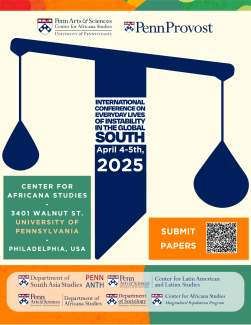
Since the onset of the COVID-19 pandemic, there has been growing acknowledgment that the world is on the brink of a cascading and connected set of crises. The term polycrisis has gained renewed traction as the descriptor of the instability of our times and the cluster of related global risks with compounding effects (World Economic Forum 2023) that degrade humanity’s prospects (Lawrence, Janzwood, and Homer-Dixon 2022). For some, the moniker of polycrisis has underscored the complexity and the inextricable links of different crises. Nevertheless, the narrative of polycrisis raises the question of whose crisis is prioritized. As Allouche et al. (2023) note, while the deepening instability may be inherently troubling for those in the global north who have been used to stability since the Second World War, ‘for the majority around the world, though, dealing with insurmountable challenges has been part of daily life for centuries.’ However, the crisis of instability in the Global South has become more acute and far more devastating in the contemporary era. Yet, even in the face of crisis and instability, local communities have adapted and have demonstrated considerable adeptness in their responses, such that life, as it were, has ‘carried on’.
The international conference organized by the Center for Africana Studies in collaboration with the Provost’s Office, Department of South Asia Studies, Department of Anthropology, Center for Latin American and Latinx Studies, Department of Africana Studies, Department of Sociology and the Marginalized Populations Program on ‘Everyday Lives of Instability in the Global South’ will focus on the tactics, strategies, and coping mechanisms that people and communities have developed in the face of the contemporary crisis of (social, economic, and political) instability—manifesting as uncertainty, precarity, insecurity, and/or vulnerability. We broadly define the contemporary crisis in terms of instability while recognizing that such instability emerges from various sources. Such sources include war and conflict, insecurity, economic crisis, devaluation, fiscal instability, state weakness and incapacity, etc. However, drawing from Butler and Agamben’s contention, our concern is not only with the statist order and the limitations of the state but also with the wider forces of hyper-capitalism that have contributed to new forms of bio-politics that make certain lives unliveable and differentially precarious. We, therefore, seek to work with a more expansive definition of instability produced by endemic conflicts, the limited authority of the state and its enforcement capacity, extreme concentration of wealth, and the increasing risk of climate change (Piketty, 2020). In examining everyday responses to such instability, we seek reflections on the forms and range of emergent governance arrangements and the institutions that take root, provide, and implement collectively binding rules and/or secure collective goods (Borzel et al., 2018). We also seek reflections on alternate forms of everyday governance that have emerged in response to the threats of instability. Additionally, organizers invite studies concerned with how people and communities adjust to transforming market logic, produce ‘alternative forms of rationality and valuation’ tied to local notions of economic justice (Geschiere et al., 2007, p. 38), and devise (new) modes of ‘vernacular resilience’ (Wandji et al., 2021), as well as the effects of these on state-society processes and the fabric of social relations and institutions.
Core Themes & Questions:
How do the contemporary challenges of instability (re)define everyday life in the Global South? How are lives in the Global South destabilized and recomposed in the face of the emergencies and contingencies induced by late capitalism? What are the modes of ‘vernacular resilience’ (Wandji et al., 2021) in the context of multiple structural crises? What practices (including aesthetics) of ‘getting by’ (debrouillardise) have emerged in the context of rural and urban livelihoods in the Global South? How can we theorize instability and everyday life within the context of the common but plural experiences of the global South?
We invite abstracts that speak to these and related questions in any part of the Global South, including comparative perspectives from the Global North – or what might be described as ‘Global South in the Global North.’
- This will be a hybrid conference. However, we encourage in-person presentations.
- Papers presented at the conference will be considered for an edited volume.
Abstracts (between 250 and 300 words) should be submitted to Dr. Gayatri Sahgal: gsahgal@sas.upenn.edu
Deadline for submission of abstracts: January 30, 2025.
Invited presenters will be notified by February 10, 2025.
Venue: University of Pennsylvania, Philadelphia, USA.
Conference organizers: Professor Michael Hanchard, Professor Wale Adebanwi, and Dr. Gayatri Sahgal
